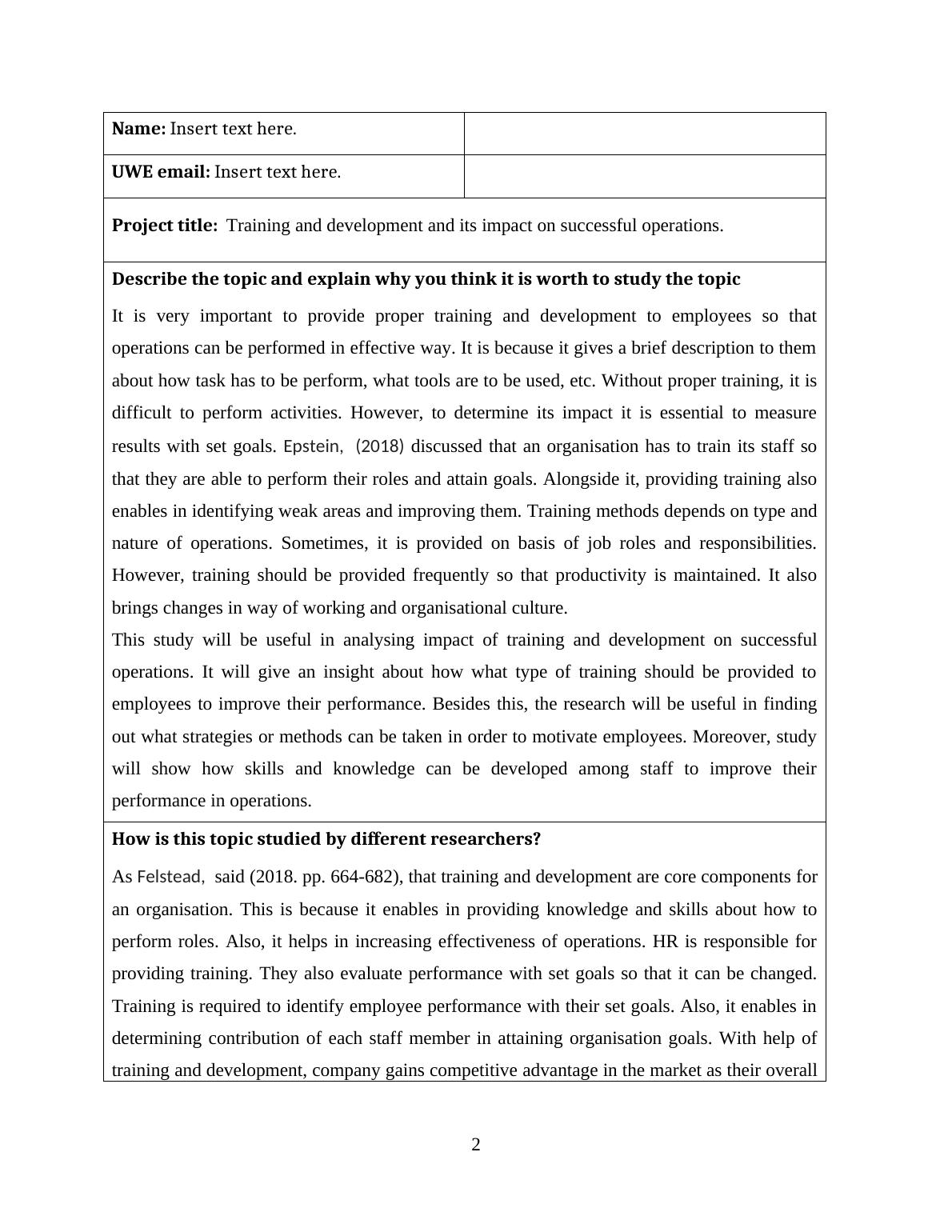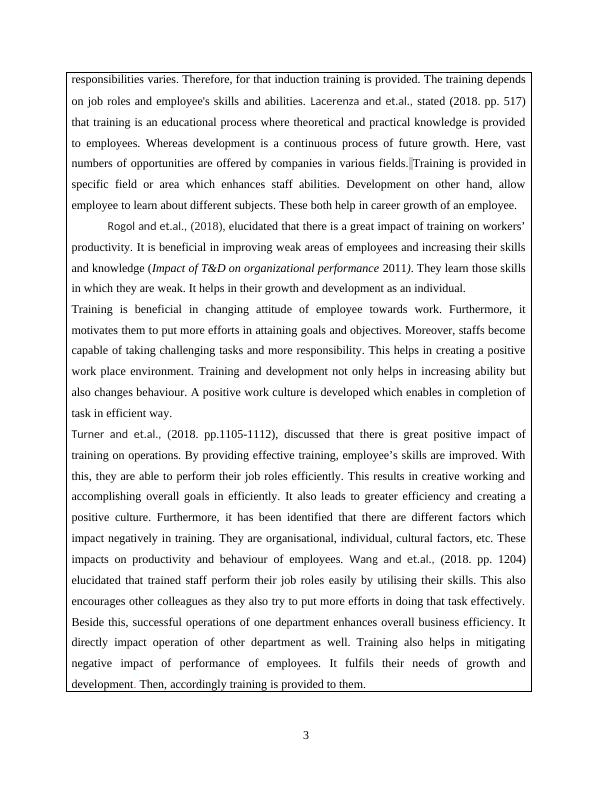Ask a question from expert
Training and Development and its Impact on Successful Operations
7 Pages2677 Words327 Views
Added on 2020-10-23
Training and Development and its Impact on Successful Operations
Added on 2020-10-23
BookmarkShareRelated Documents
DISSERTATIONPROPOSAL

Name: Insert text here.UWE email: Insert text here.Project title: Training and development and its impact on successful operations.Describe the topic and explain why you think it is worth to study the topicIt is very important to provide proper training and development to employees so thatoperations can be performed in effective way. It is because it gives a brief description to themabout how task has to be perform, what tools are to be used, etc. Without proper training, it isdifficult to perform activities. However, to determine its impact it is essential to measureresults with set goals. Epstein, (2018) discussed that an organisation has to train its staff sothat they are able to perform their roles and attain goals. Alongside it, providing training alsoenables in identifying weak areas and improving them. Training methods depends on type andnature of operations. Sometimes, it is provided on basis of job roles and responsibilities.However, training should be provided frequently so that productivity is maintained. It alsobrings changes in way of working and organisational culture. This study will be useful in analysing impact of training and development on successfuloperations. It will give an insight about how what type of training should be provided toemployees to improve their performance. Besides this, the research will be useful in findingout what strategies or methods can be taken in order to motivate employees. Moreover, studywill show how skills and knowledge can be developed among staff to improve theirperformance in operations. How is this topic studied by different researchers? As Felstead, said (2018. pp. 664-682), that training and development are core components foran organisation. This is because it enables in providing knowledge and skills about how toperform roles. Also, it helps in increasing effectiveness of operations. HR is responsible forproviding training. They also evaluate performance with set goals so that it can be changed.Training is required to identify employee performance with their set goals. Also, it enables indetermining contribution of each staff member in attaining organisation goals. With help oftraining and development, company gains competitive advantage in the market as their overallefficiency is improved. In every business, there are different types of operations. In each one, job roles and2

responsibilities varies. Therefore, for that induction training is provided. The training dependson job roles and employee's skills and abilities. Lacerenza and et.al., stated (2018. pp. 517)that training is an educational process where theoretical and practical knowledge is providedto employees. Whereas development is a continuous process of future growth. Here, vastnumbers of opportunities are offered by companies in various fields.Training is provided inspecific field or area which enhances staff abilities. Development on other hand, allowemployee to learn about different subjects. These both help in career growth of an employee. Rogol and et.al., (2018), elucidated that there is a great impact of training on workers’productivity. It is beneficial in improving weak areas of employees and increasing their skillsand knowledge (Impact of T&D on organizational performance 2011). They learn those skillsin which they are weak. It helps in their growth and development as an individual. Training is beneficial in changing attitude of employee towards work. Furthermore, itmotivates them to put more efforts in attaining goals and objectives. Moreover, staffs becomecapable of taking challenging tasks and more responsibility. This helps in creating a positivework place environment. Training and development not only helps in increasing ability butalso changes behaviour. A positive work culture is developed which enables in completion oftask in efficient way. Turner and et.al., (2018. pp.1105-1112), discussed that there is great positive impact oftraining on operations. By providing effective training, employee’s skills are improved. Withthis, they are able to perform their job roles efficiently. This results in creative working andaccomplishing overall goals in efficiently. It also leads to greater efficiency and creating apositive culture. Furthermore, it has been identified that there are different factors whichimpact negatively in training. They are organisational, individual, cultural factors, etc. Theseimpacts on productivity and behaviour of employees. Wang and et.al., (2018. pp. 1204)elucidated that trained staff perform their job roles easily by utilising their skills. This alsoencourages other colleagues as they also try to put more efforts in doing that task effectively.Beside this, successful operations of one department enhances overall business efficiency. Itdirectly impact operation of other department as well. Training also helps in mitigatingnegative impact of performance of employees. It fulfils their needs of growth anddevelopment. Then, accordingly training is provided to them.3

End of preview
Want to access all the pages? Upload your documents or become a member.
Related Documents
Managing People in Aviationlg...
|9
|964
|30
Human Resource Management for Service Industrieslg...
|13
|3827
|79
Importance of Training and Development on Employee Retention in ASDAlg...
|11
|2020
|55
Unit 3: Human Resource Managementlg...
|18
|4893
|21
Significance of Employee Training to Raise Organizational Profitlg...
|6
|1352
|404
BSBCMM401 Make a Presentation - Tips and Strategieslg...
|12
|2414
|322